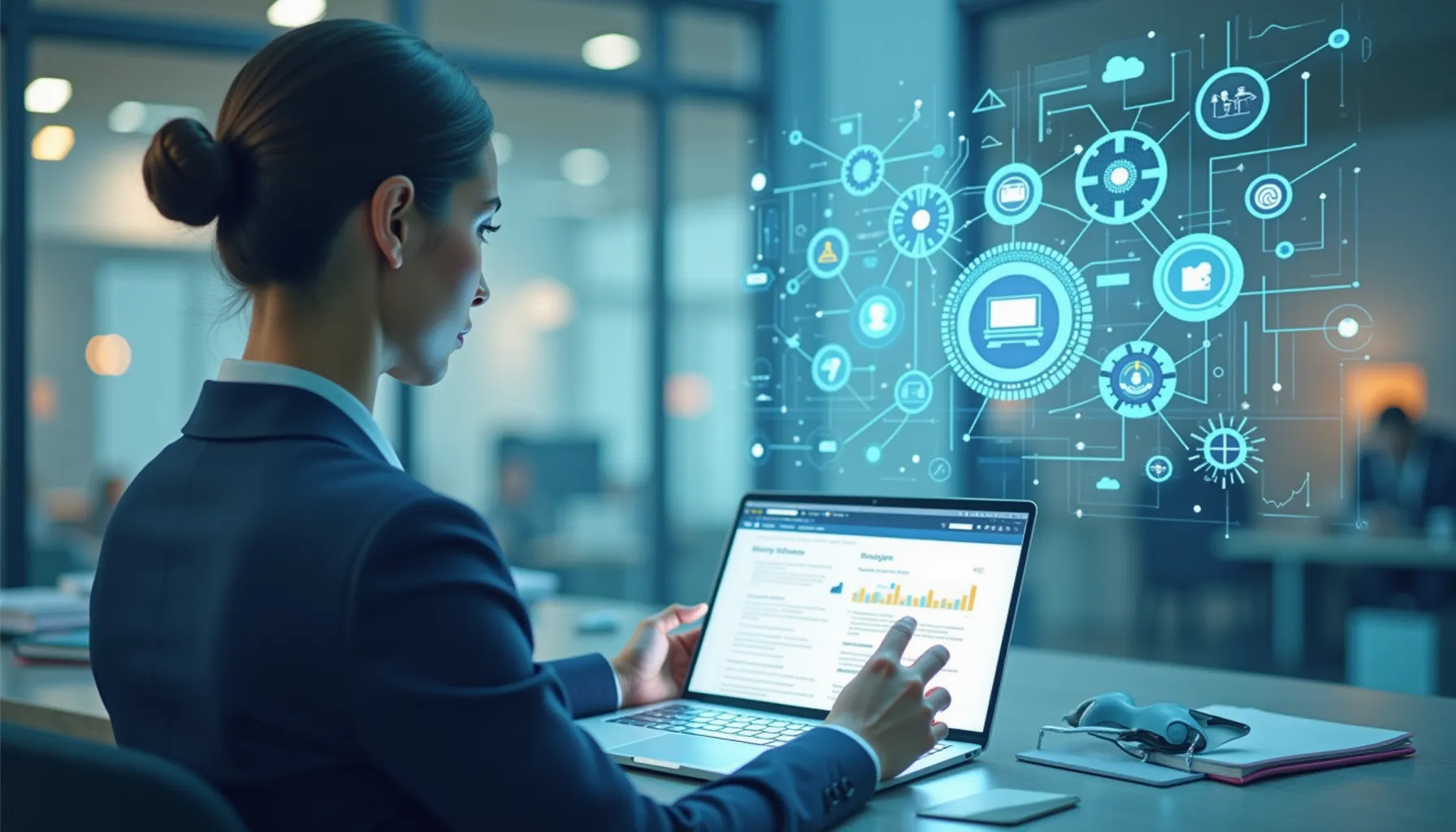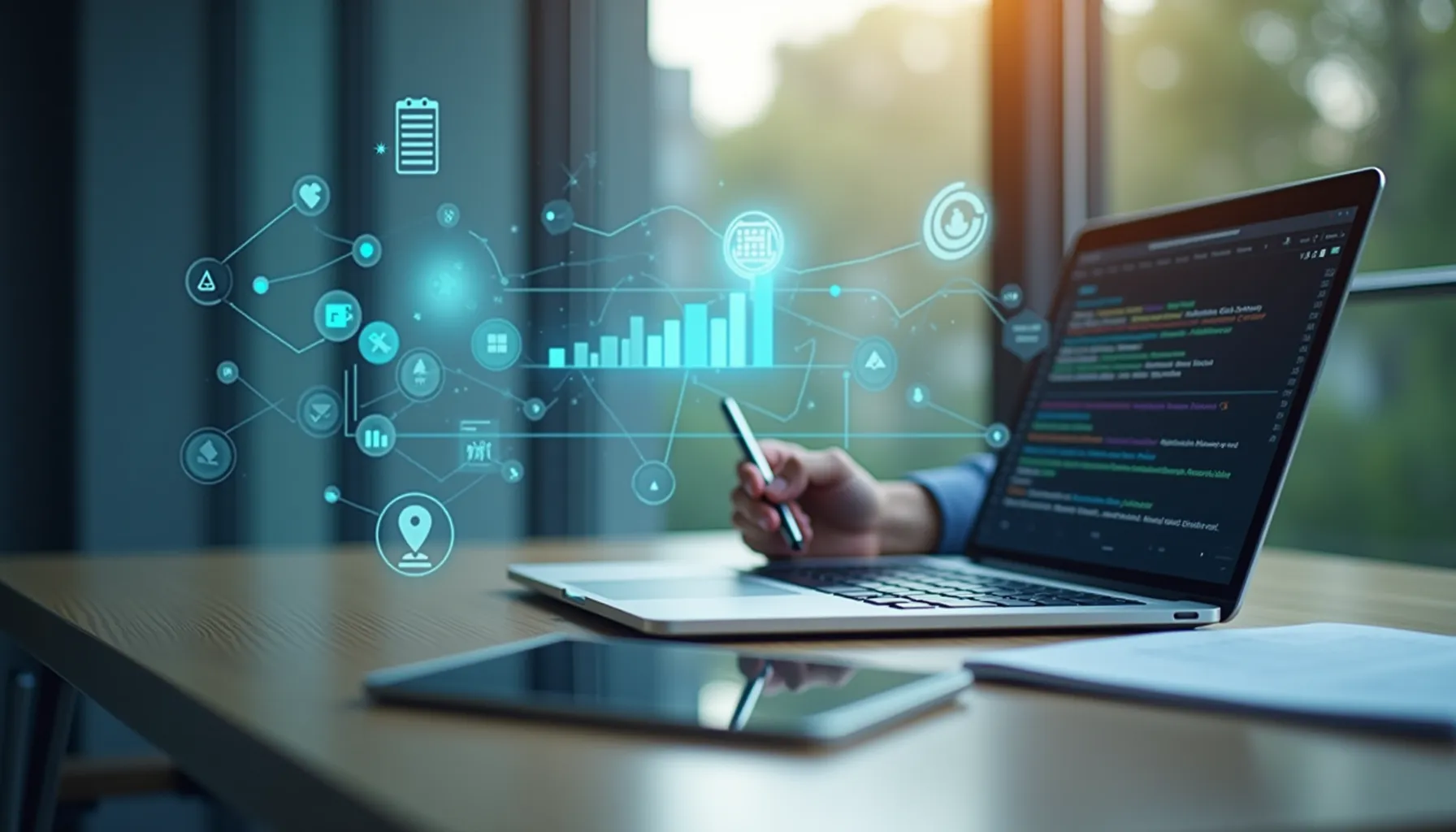AI in the Workplace Statistics: Transforming Job Markets Now
-
Jan. 4, 2025
-
Greg More

The rise of AI in the workplace is revolutionizing how we work, think, and innovate. As a digital marketer who's witnessed countless tech shifts, I can tell you: this one's a game-changer. The numbers don't lie – a staggering 77% of companies are already using or exploring AI, according to a recent McKinsey report.
But what does this mean for you and me? Whether you're a CEO, a fresh graduate, or somewhere in between, understanding these AI workplace statistics isn't just interesting – it's crucial for navigating our rapidly evolving professional landscape.
In this article, we'll dive deep into the numbers that matter, exploring how AI is reshaping job markets, boosting productivity, and challenging our notions of work. Let's unpack this together and see what the future holds for all of us in this brave new AI-powered world.
Key Takeaways:
- AI adoption is skyrocketing, with 83% of companies prioritizing it in their business plans
- By 2025, AI could eliminate 85 million jobs but create 97 million new ones
- AI is projected to boost labor productivity by 1.5 percentage points
- 56% of companies are using AI in customer service roles
- The global AI market is expected to grow by 33% year-over-year in 2024

The Current Landscape: AI Adoption Trends
AI isn't just knocking on the door of the business world; it's kicked it wide open. The adoption rates we're seeing are nothing short of staggering. In my years in digital marketing, I've never seen a technology embraced so rapidly across so many industries.
Let's break it down. A whopping 77% of companies are either already using AI or exploring its potential. This isn't just casual interest – it's a full-blown revolution in how we do business.
Global AI Implementation Rates Across Industries
The AI wave is hitting different sectors with varying intensity. In tech and telecom, AI adoption is through the roof. But even traditionally slower-moving industries like healthcare and manufacturing are catching up fast.
For instance, in healthcare, AI is revolutionizing everything from drug discovery to patient care. Over in finance, AI-powered algorithms are reshaping investment strategies and fraud detection.
Factors Driving AI Integration in Businesses
So, what's fueling this AI frenzy? From where I stand, it's a perfect storm of technological advancements, competitive pressure, and the promise of enhanced efficiency.
Companies are realizing that AI isn't just a nice-to-have; it's becoming essential for staying competitive. The potential for cost savings and productivity gains is too significant to ignore.
Challenges Companies Face in Adopting AI Technologies
But it's not all smooth sailing. Many businesses are grappling with the complexities of AI implementation. The biggest hurdles? Lack of skilled personnel, data quality issues, and concerns about AI ethics and governance.
I've seen companies struggle to integrate AI into their existing systems. It's not just about plugging in a new technology; it often requires a complete rethinking of business processes.
AI's Impact on the Job Market
Now, let's talk about the elephant in the room – jobs. The impact of AI on employment is a hot-button issue, and for good reason. It's reshaping the job market in ways we're only beginning to understand.
Job Creation vs. Displacement: Breaking Down the Numbers
Here's the headline: AI is both creating and eliminating jobs. The World Economic Forum predicts that by 2025, AI could displace 85 million jobs. Sounds scary, right? But here's the flip side – it's also expected to create 97 million new roles.
This isn't just reshuffling; it's a fundamental shift in the types of jobs available. We're moving from routine, repetitive tasks to roles that require uniquely human skills like creativity and emotional intelligence.
Emerging Roles and Skills in the AI-Driven Economy
So, what are these new jobs? We're seeing a surge in demand for data scientists, AI specialists, and machine learning engineers. But it's not just tech roles. There's a growing need for AI ethicists, automation managers, and human-AI collaboration specialists.
The key is adaptability. In my career, I've had to reinvent myself several times, and I see AI as just another opportunity for growth and learning.
Industries Most Affected by AI Automation
Some sectors are feeling the impact of AI more than others. Manufacturing, customer service, and data entry are seeing significant automation. But even creative fields like journalism and graphic design are starting to incorporate AI tools.
However, it's not about wholesale replacement. It's about augmentation – using AI to enhance human capabilities rather than replace them entirely.
Productivity and Performance: AI as a Workplace Catalyst
Let's talk about something we all care about – getting more done in less time. AI is proving to be a game-changer when it comes to workplace productivity and performance.
Quantifying AI's Effect on Worker Efficiency
The numbers here are eye-opening. AI is projected to boost labor productivity by 1.5 percentage points. That might not sound like much, but in productivity terms, it's huge.
In my own work, I've seen how AI tools can take care of repetitive tasks, freeing up time for more strategic thinking. It's not about working harder; it's about working smarter.
Case Studies: Companies Reaping the Benefits of AI Integration
Let's look at some real-world examples. Amazon uses AI for inventory management and logistics, dramatically improving efficiency. Google's DeepMind AI helped reduce the company's data center cooling bill by 40%.
These aren't just big tech stories. I've seen small businesses use AI chatbots to handle customer inquiries 24/7, significantly improving customer satisfaction and freeing up staff for more complex tasks.
The Human-AI Collaboration: Enhancing Decision-Making Processes
One of the most exciting aspects of AI in the workplace is how it's enhancing our decision-making abilities. AI can analyze vast amounts of data and provide insights that humans might miss.
But it's not about AI making decisions for us. It's about creating a partnership where AI handles the data crunching, and humans apply judgment, creativity, and emotional intelligence to make the final call.
The AI Skills Gap: Education and Training Imperatives
As AI reshapes our workplaces, a glaring issue has emerged: the AI skills gap. It's a challenge I've seen firsthand in my work with various organizations. The demand for AI-related skills is skyrocketing, but our workforce isn't keeping pace.
Current State of AI Literacy Among Workers and Educators
The numbers are sobering. Only 10% of educators prioritize teaching AI, while a staggering 87% lack AI training themselves. This gap isn't just in schools; it's pervasive across industries.
I've met countless professionals who feel overwhelmed by AI. They know it's important, but they don't know where to start. It's like we're asking people to navigate a new world without a map.
The Growing Demand for AI-Related Skills Across Sectors
The demand for AI skills isn't confined to tech companies anymore. From healthcare to finance, marketing to manufacturing, every sector is hungry for AI talent. Data scientists, machine learning engineers, and AI ethicists are some of the most sought-after roles.
But it's not just about specialists. There's a growing need for everyone to have at least a basic understanding of AI. It's becoming as fundamental as computer literacy was a generation ago.
Strategies for Upskilling and Reskilling in the Age of AI
So, how do we bridge this gap? It's a challenge, but not an insurmountable one. Companies are investing in training programs, partnering with educational institutions, and encouraging continuous learning.
Personally, I'm a big advocate for hands-on learning. Start small, experiment with AI tools in your work, and gradually build your skills. Online courses, workshops, and even AI-focused bootcamps are great resources.
Trust, Ethics, and Regulation in AI Implementation
As we rush to adopt AI, we can't ignore the elephant in the room: trust and ethics. It's a topic that keeps many business leaders up at night, and for good reason.
Employee Attitudes Towards AI in the Workplace
Employee attitudes towards AI are... complex, to say the least. In my conversations with workers across industries, I've encountered everything from excitement to deep-seated fear.
Interestingly, about 68% of employees want more AI technology in their workplace. They see the potential for AI to take over mundane tasks and free them up for more meaningful work. But there's also anxiety about job security and the pace of change.
Addressing Privacy Concerns and Data Security
Privacy and data security are hot-button issues when it comes to AI. And let's be honest, they should be. AI systems often require vast amounts of data to function effectively, raising concerns about how this data is collected, used, and protected.
I've seen companies grapple with these issues firsthand. It's not just about complying with regulations like GDPR; it's about building trust with employees and customers. Transparency is key here – people want to know what data is being collected and how it's being used.
The Role of Government and Industry in Shaping AI Policies
As AI becomes more pervasive, the call for regulation is growing louder. It's a delicate balance – we want to foster innovation, but we also need to protect against potential misuse.
Governments worldwide are starting to respond. The EU's proposed AI Act is a prime example. But industry also has a crucial role to play. Many tech companies are advocating for responsible AI development and use.
Future Projections: AI's Long-term Impact on Work
As we peer into the future of AI in the workplace, it's clear we're on the cusp of a transformation as significant as the Industrial Revolution. The potential is enormous, but so are the challenges.
Economic Forecasts: AI's Contribution to Global Productivity
The numbers are staggering. AI is projected to contribute $15.7 trillion to the global economy by 2030. That's not just growth; it's a seismic shift in how value is created and distributed.
In my view, this isn't just about replacing human labor with machines. It's about augmenting human capabilities, allowing us to solve problems we never thought possible.
Evolving Workplace Dynamics: Remote Work and AI Synergy
The pandemic accelerated remote work, and AI is set to take it to the next level. We're moving towards a world where physical location matters less, and output matters more.
AI-powered tools are making remote collaboration more effective than ever. From real-time language translation in video calls to AI assistants that schedule meetings across time zones, the possibilities are endless.
Preparing for the Next Wave of AI Innovations in Business
So, how do we prepare for this AI-powered future? It's about more than just learning to use new tools. It's about developing a mindset of continuous adaptation and learning.
In my experience, the most successful individuals and organizations are those that stay curious, embrace change, and see AI as a partner rather than a threat. The future of work is here, and it's more exciting than ever.

Embracing the AI-Powered Future
As we stand on the brink of this AI revolution, it's clear that the future of work is not just about machines – it's about us. The statistics we've explored paint a picture of rapid change, but they also reveal incredible opportunities for those willing to adapt and grow.
AI isn't replacing us; it's empowering us to reach new heights of creativity and innovation. It's freeing us from mundane tasks and allowing us to focus on what makes us uniquely human – our ability to empathize, create, and solve complex problems.
But this future isn't guaranteed. It requires action from all of us – individuals, businesses, and policymakers. We need to prioritize continuous learning, embrace ethical AI practices, and work towards creating an inclusive AI-powered workforce.
The AI revolution in the workplace isn't something that's happening to us – it's something we're actively shaping. So, let's shape it wisely, ensuring that AI becomes a tool for empowerment, not displacement. The future of work is in our hands, and it's looking brighter than ever.
Frequently Asked Questions
How is AI changing job roles in the workplace?
AI is reshaping job roles by automating routine tasks and creating new positions focused on AI management and development. While some jobs may be displaced, AI is also creating opportunities in data science, machine learning, and AI ethics. The key is to adapt and develop skills that complement AI capabilities.
What skills will be most valuable in an AI-driven workplace?
In an AI-driven workplace, skills like critical thinking, creativity, emotional intelligence, and complex problem-solving will be highly valued. Technical skills in data analysis, programming, and AI management will also be crucial. Adaptability and continuous learning will be essential for thriving in this evolving landscape.
How can businesses effectively implement AI while addressing ethical concerns?
Businesses can implement AI effectively by prioritizing transparency, data privacy, and ethical considerations. This involves clear communication about AI use, robust data protection measures, and establishing ethical guidelines for AI development and deployment. Collaboration with AI ethics experts and ongoing employee training are also crucial steps.
What impact will AI have on workplace productivity?
AI is projected to significantly boost workplace productivity by automating routine tasks, enhancing decision-making processes, and enabling more efficient resource allocation. Studies suggest AI could improve labor productivity growth by 1.5 percentage points, leading to substantial economic benefits across various industries.
How can employees prepare for the AI transformation in their workplace?
Employees can prepare for AI transformation by staying informed about AI developments in their industry, actively seeking opportunities to work with AI tools, and continuously updating their skills. Engaging in online courses, attending workshops, and being open to new roles that involve AI can help in adapting to this technological shift.


